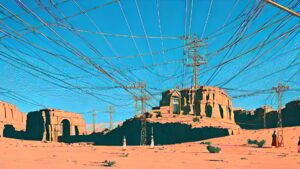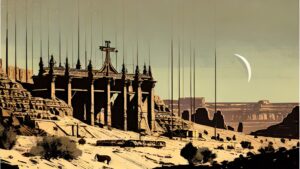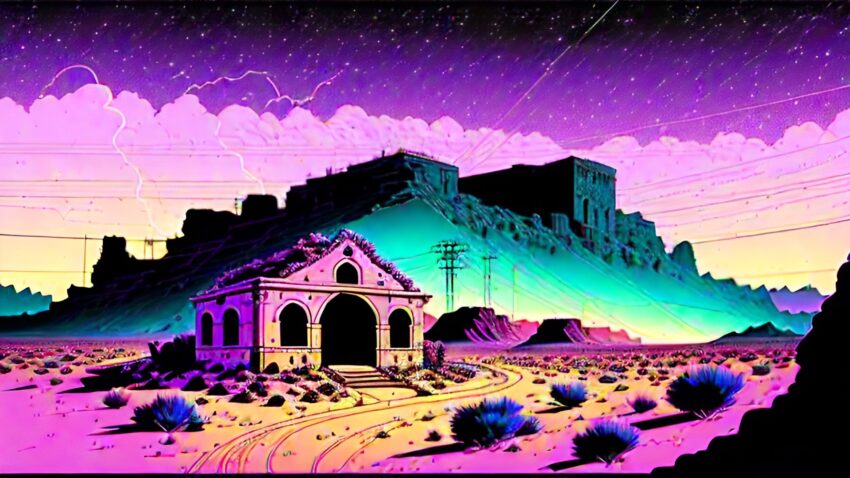American Prometheus: “There are earth energies emanating from places across [New Mexico] that are healing and raising consciousness — Taos even has an audible hum. The official nickname of New Mexico is ‘The Land of Enchantment,’ and it enchanted the young [Oppenheimer]. The other meaning of enchantment — that of alchemy/magic/spirituality/occultism — also applies to New Mexico. The geography, history, and nomenclature hint at a cosmological spiritual war: the city of Santa Fe (Holy Faith), the sacred mountains of Sangre de Cristo (Blood of Christ) and Shiprock, the roads Jornada del Muerto (Journey of Death) and El Camino del Diablo (Devil’s Highway), to name just a few.”
Cybergothic — from John Milton to Nick Land: “Do you wish to play Neuromancer or Wintermute? Are you Zero or One? Are you Light or Dark? Are you Satan or God?”
Downstream of Darwin: “God did not create The Thunderdome. He did not create a crucible where every organism has to prove itself by outcompeting everything else. That’s not where we live. That’s not what this is. Society sure seems to think so though. And unfortunately Darwin’s theories are for the damned.”

Full Moon in Aquarius: “Personal examination of consciousness is in order. What are we being asked to part with? What are we shedding? What are the things we thought we valued, but are of no more use to us?”
In Defence of the Virgin — the Queen of Heaven: “The saints in heaven are higher then the angels. This providential plan was in part why the initial rebellion occurred in heaven. If God used his Angels to communicate prophecy to man before the divine incarnation, why wouldn’t he use his new Saints in heaven (who fulfill a similar role in his administration) to do the same after the incarnation? And why would he not use his greatest saint, the Queen of Heaven, to communicate his greatest prophecy?”
The Culture of Transgression: “The cultural ferment in contemporary North America and Europe does not feel like an interregnum between one cultural regime and a stable successor. It feels like a permanent revolution. Put another way, the Western elite culture of transgression is an example of antinomianism, not iconoclasm. Unlike iconoclasm, antinomianism is not a temporary campaign of destruction of older iconography and traditions to clear the way for the imposition of new canons and orthodoxies. Derived from the Greek words meaning ‘against’ and ‘law’ or ‘norm,’ the term antinomianism refers to the view that all laws and norms are oppressive always and everywhere, and that the act of transgression in itself is virtuous, if not holy.”
The Lost Architect of the Human Condition: “For Nemesius, politics parallels spirit and body. Just as the soul has a unique power to rationally govern the subrational elements of the body—which, like wild horses to the charioteer, are capable of rebellion—in a similarly natural vein polities must repress their irrational elements to structure themselves towards the good. Likewise, God ensures his providence balances human freedom with constraints on evil (as human law enforces responsibility for sin) and boons for repentance (that it is possible to pursue the truly good life in a fallen world).”
The Need for Ceremony: “…psychedelics may be helpful or unhelpful, or helpful and then unhelpful. The key point is that, just as anyone attempting a repair job on a semi-functional piece of machinery runs the risk of destroying it totally, using mind-altering substances without understanding them can severely damage your mind.”
Why Are You So Weird? “One of the great shifts in human history was the rise of the bronze age individual, or more specifically, the male warrior. This can be seen both in the material culture of the period (chariots, personal drinking vessels, individual graves, personal grooming objects, bodily adornments), and in the development of a broader Indo-European cultural sphere which emphasised weaker kinship bonds, monogamy, small nuclear families and social militarism.”

